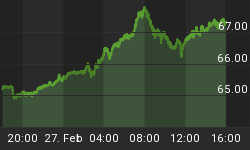The Fourth of July week brought unwelcome birthday gifts to the United States in the form of poor domestic jobs data and similarly gloomy information from other major economies. Amidst the heat and festivities, it has become difficult to deny that the economy is deteriorating. Politicians appear helpless, thrashing about for a solution and blaming everything and everyone but themselves. This lack of leadership is apparent to those who have by now lost all confidence of a possible quick rebound, if only the tough decisions had been made early and swiftly.
For many of us the reality is simple: government has become too big, too costly and too aggressive. This has progressed to the point where what's left of the free enterprise system is now suffocating. Furthermore, the costs of massive amounts of quantitative easing (QE) and artificially low interest rates are perpetuating sluggish and unproductive economies both here and in Europe. Unless radical change is implemented, our economic future will be bleak.
The tepid "recovery" of the last few years has restored just 4 million of the roughly 9 million jobs lost in 2008-10. Last week it was announced that in June 2012 American employers added only 80,000 jobs, a figure far below expectations. It appeared even worse when seen in context. In the first six months of 2011, employers added an average of 160,000 jobs each month. In the same period of 2012 that figure dipped to 150,000. The decline occurred despite the supposedly stimulative effects of negative interest rates and trillions of dollars of government deficits.
The same story is unfolding in the world's largest economy, the 17-nation Eurozone. In order to survive its own crisis, the Europeans have agreed to issue more debt and have consented to greater EU sovereignty over their national governments. Whether this additional layer of oversight can rein in excesses or, instead, merely results in greater economic stagnation remains to be seen.
But irrespective of whether one is looking at the Eurozone or the U.S., massive regulation in the marketplace has smothered businesses and stifled employment. Rather than helping the West change course, however, our politicians are simply taking the path of least resistance - leaving us with high taxes and unimaginable debt in the process. With Europe and America grinding to a halt, the economies of even the vibrant emerging markets, such as China, have now begun to lose traction.
This leadership vacuum has created a massive sense of uncertainty for consumers, business, and banks. All are hoarding their resources as the prolonged recession discourages needed risk taking. Given this, it is easy to see why the massive waves of monetary injections are not helping to produce real growth. Most of the cash is simply avoiding the private sector entirely and is being recycled back into government debt. This only encourages greater growth in government without any tangible economic benefits.
What we are seeing is the endgame of a nearly century long experiment in big government. Although the most radical facets of that experiment have long ago been assigned to the dustbin of history (the Soviet Union, Maoist China), the welfare states of the West have now produced unviable economies.
To turn this economy around, the restoration of consumer and business confidence is paramount. But more stimulus or bailouts will not accomplish this. Instead, confidence can only be restored by a drastic reduction in big government. Lower tax burdens, less onerous regulation, and the end of state sponsored crony capitalism will energize real businesses. Let the people know that this experiment is coming to an end and they will have the confidence to put their capital into play.
If this does not happen soon, the world risks a savage depression. The real danger will arise if that is met by even more dramatic experiments with the printing press. A collapse of the global fiat currency system could then ensue.
Investors, then, are faced with a difficult situation, particularly regarding timing. Government attempts thus far to prevent recession have encouraged an unprecedented level of leverage. The deleveraging associated with recession is therefore much more dangerous than what we would see in a typical recession. Therefore, in the economic calamity to come, most things owned will shrink in value, while those items needed, such as food, heath services, and energy will rise in price.
Unlike the relatively mild post-war recessions, this recession threatens to spark a global currency crisis. Already, led by the Chinese, some important nations are calling for a replacement of the U.S. dollar as the reserve currency. The situation is now so serious that it portends a collapse of the entire fiat monetary system, perhaps with a return to some form of gold standard. Already, most important central banks have ceased selling gold and now are hoarding the metal. Many private investors are wisely following their lead.
Subscribe to Euro Pacific's Weekly Digest: Receive all commentaries by Peter Schiff, John Browne, and other Euro Pacific commentators delivered to your inbox every Monday!
Order a copy of Peter Schiff's new book, The Real Crash: America's Coming Bankruptcy - How to Save Yourself and Your Country, and save yourself 35% off















